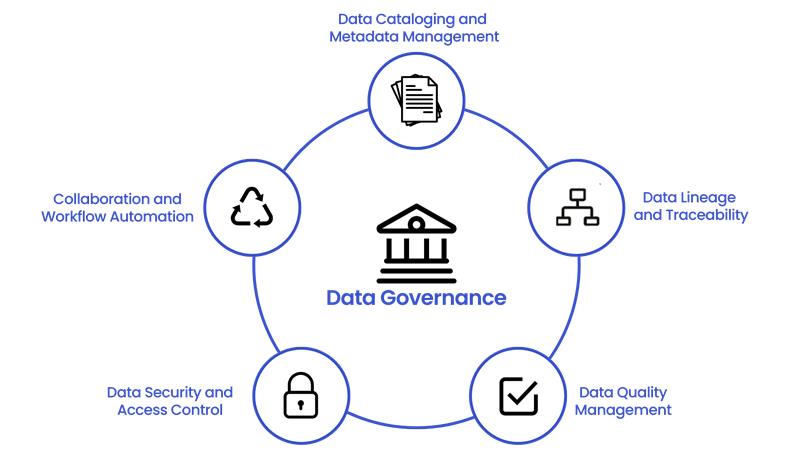Ready to revolutionize your data journey with Infoveave?
Recent Blogs
- How Data Automation And Data Engineering Are Transforming Healthcare
- How Data Automation Tools Are Transforming Manufacturing
- How Data Automation and Data Engineering Are Revolutionizing the Telecom Industry
- How Data Automation is Powering the Retail Energy Industry
- How Data Automation and Data Engineering Are Revolutionizing the Automotive Industry
From Burden to Benefit : How Data Governance Tools Unlock Strategic Advantage
Introduction
For many organizations, the term data governance has historically suggested restrictive policies, lengthy compliance checklists, and an administrative layer that slows innovation. It was often viewed as a cost center, necessary to meet regulations such as GDPR, CCPA, or HIPAA, but offering limited strategic value. This perception is not accurate and limits an organization’s ability to compete in a data driven economy.
Modern enterprises recognize that effective governance is not simply about meeting regulatory requirements. It is the foundation for turning data into a trusted enterprise-wide asset. When supported by advanced governance tools, data management moves from a defensive posture to an offensive strategy that fuels growth and innovation.
Establishing Data as a Strategic Asset
The shift occurs when leadership stops asking, “What must we do to remain compliant?” and starts asking, “What can we achieve with reliable, well understood, and accessible data?”
A robust governance framework enables an environment of data trust where executives, managers, and analysts can act confidently on accurate information.
Consider a marketing team preparing a personalized campaign. Without governance, they may draw information from multiple conflicting sources, risking outdated or incomplete data. The result can be ineffective targeting and unnecessary cost.
With strong governance, the team accesses a certified customer record through a central data catalog. They review documented lineage to confirm how the information was collected and transformed, while predefined quality rules ensure accuracy. Security controls allow only authorized access, maintaining privacy and compliance. The outcome is an efficient, well-targeted campaign that enhances customer engagement and increases revenue.
Core Capabilities of Modern Data Governance Platforms

Data Cataloging and Metadata Management
-
Automated scanning and indexing of enterprise data assets across databases, warehouses, and reports
-
Enrichment with business context such as definitions, ownership, and classifications
-
Accelerates discovery and reduces time spent interpreting metrics
Data Lineage and Traceability
-
Visual mapping of a data element’s journey from source to consumption
-
Enables rapid impact analysis and supports audit requirements
-
Builds confidence in reporting by clarifying data origins and transformations
Data Quality Management
-
Profiling to assess condition, application of cleansing rules, and continuous monitoring
-
Ensures accuracy, consistency, and completeness for analytics and AI initiatives
-
Protects strategic projects from the risks of unreliable data
Data Security and Access Control
-
Granular, role-based permissions with masking and encryption to safeguard sensitive information
-
Supports safe democratization of data by ensuring users see only what they are authorized to access
-
Strengthens internal and external trust in data handling
Collaboration and Workflow Automation
-
Integrated platforms for data stewards, analysts, and business users to certify datasets, request access, and resolve issues through automated workflows
-
Encourages shared responsibility and consistent policy application across departments
Infoveave: Enabling Enterprise Wide Governance
Technology alone is effective only when delivered through a cohesive, user friendly platform. Infoveave provides this foundation with a comprehensive suite designed to meet the needs of modern governance programs:
Unified Data Catalog
AI powered creation and curation of data assets enriched with glossary terms.
End to End Lineage
Interactive visualizations that display complete data flows, enabling instant impact analysis and reinforcing trust in data pipelines
Integrated Data Quality
Built in monitoring and rule based remediation to ensure data reliability before it reaches critical decision points
Robust Security Practices
Granular access controls and strong encryption that allow broad data access without compromising protection
Foundational Strengths
To support these core functions, Infoveave delivers:
Broad Integration Capabilities
Connectors to legacy on premise systems, modern cloud platforms, and SaaS applications for a unified view of the enterprise data landscape
Scalability for Growth
Cloud native architecture that accommodates expanding data volumes while maintaining performance and reliability
User Centric Design
An interface that requires no programming expertise, enabling both technical and non technical users to participate fully in governance activities
Govern Data as the Enterprise Asset It Is
Data governance is no longer an administrative obligation. It is a strategic requirement for sustainable innovation and informed decision making. Organizations that adopt comprehensive governance platforms are not merely achieving compliance; they are creating a foundation for operational efficiency, improved decision quality, and new avenues of growth.
Investing in a solution such as Infoveave positions data as a true enterprise asset - reliable, secure, and ready to drive competitive advantage.